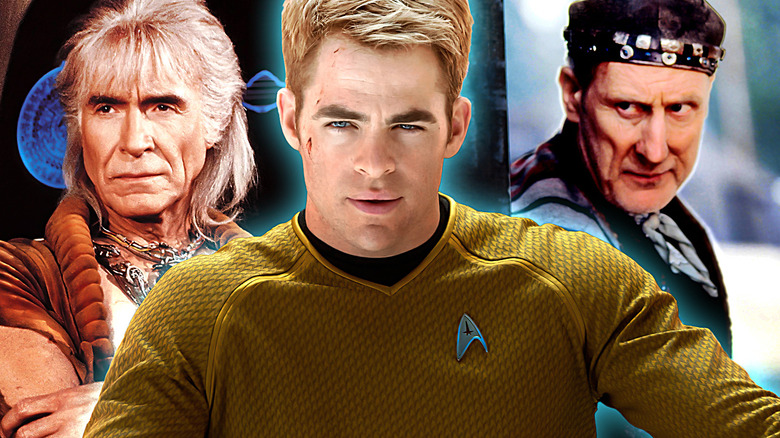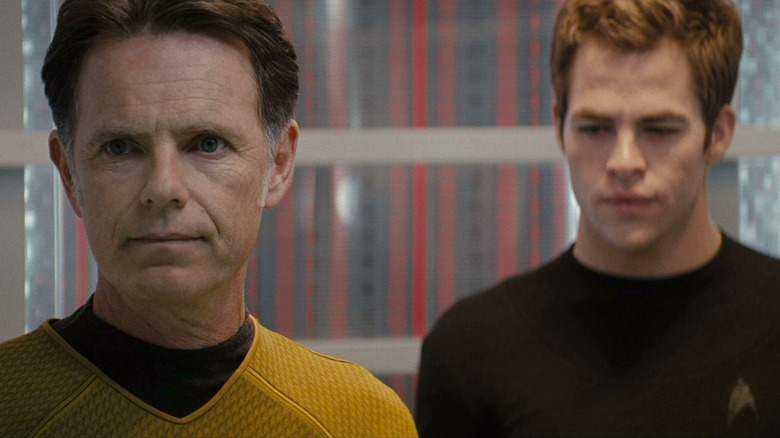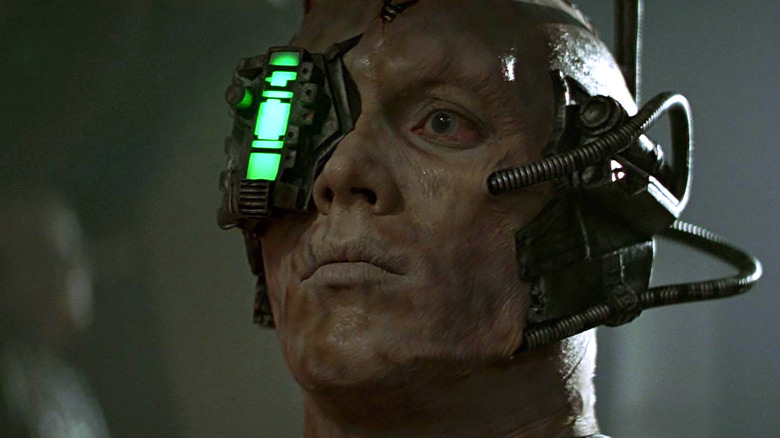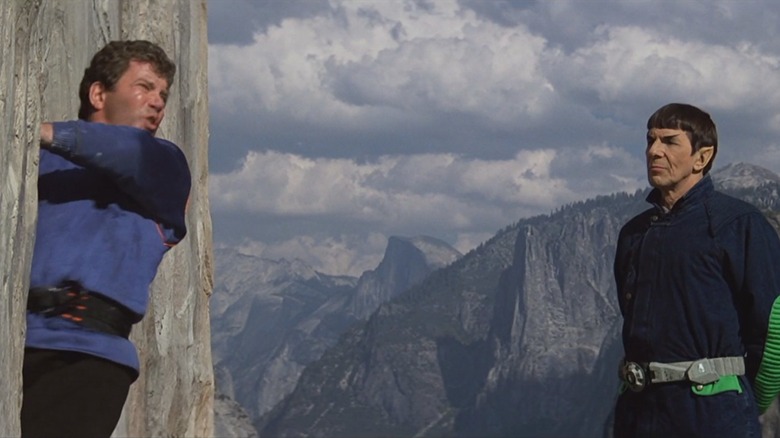The Best Star Trek Movie According To Rotten Tomatoes
To date, there have been six feature films based on "Star Trek," four based on Star Trek: The Next Generation," and three set in a rebooted timeline (called the Kelvin timeline by fans). Those 13 films were all released theatrically from 1979 to 2016, averaging one film every three years or so. Up next, "Star Trek: Section 31" is slated for release on Paramount+ sometime in 2025, and it will be the first "Star Trek" TV movie. There has also long been talk of making a fourth film in the Kelvin timeline, but that movie's fate is currently a question mark; I'll believe it when I see it.
The longstanding general consensus is that the odd-numbered "Star Trek" films are bad and unsuccessful, while the even-numbered films are amazing hits. "Star Trek: The Motion Picture," for instance, was something of a disappointment at the box office, but "Star Trek II: The Wrath of Khan" is held by many to be one of the best in the franchise. "Star Trek III: The Search for Spock," despite being an emotionally intense adventure, is often seen as a stopgap film used solely to bring Spock (Leonard Nimoy) back from the dead. It was followed by "Star Trek IV: The Voyage Home," a popular comedy film that was very financially successful. And so on.
Critical consensus, however, breaks that pattern handily, at least as far as approval ratings on Rotten Tomatoes go. The highest-rated film in the "Star Trek" franchise is an odd-numbered film. The #1 film's approval rating is only slightly higher, however, than a celebrated even-numbered "Star Trek" film from the 1990s. Although the "Star Trek" shows are most notable for their sense of diplomacy and willingness to tackle heady, philosophical problems, the highest-rated films in the series are the most violent, action-oriented ones.
Star Trek (2009)
With a 94% approval rating, based on 356 reviews, J.J. Abram's 2009 "Star Trek" movie is the best reviewed of all the "Star Trek" films on RT. Some Trekkies may find this fact disappointing since Abrams' film is a massive departure for the franchise. Rather than continue with any extant "Star Trek" lore, Abrams created an alternate timeline wherein he could reintroduce Kirk, Spock, and all the rest as younger, hotter, more tempestuous versions of themselves. This was high-octane "Star Trek," full of fights and explosions and death and drama. It's more like "Star Wars" than "Star Trek." Many of the details of Abrams' films — the ships, the characters' personality traits — were derived merely from what a non-Trekkie might know about "Star Trek" through cultural osmosis; Abrams infamously admitted that he knew little about "Star Trek" when he took on the project.
One might understand why Abrams' film was such a hit. A mass audience unfamiliar with "Star Trek" could get excited about a clean "restart," now unthreatened by the decades of lore that came before, while long-term Trekkies could attend out of morbid curiosity. A full-bore reboot of a major entertainment franchise is also a surefire way to generate a lot of ink in the entertainment press, assuring that "Star Trek" would be talked about for a full year leading up to its release.
It certainly didn't hurt that dazzlingly attractive actors played the familiar Enterprise crew. Chris Pine, Zachary Quinto, John Cho, Zoe Saldana, Anton Yelchin, Karl Urban, and Simon Pegg portrayed the leads roles, and most critics, even those who didn't like the film, admitted that the casting was pretty spot on. The only major criticisms were that the plot was thin, sacrificed in favor of fast pacing and endless action.
Make it so, numbers two and three
With a 93% approval rating, Jonathan Frakes' 1996 actioner "Star Trek: First Contact" came in as the second highest-rated "Star Trek" film on RT. That film, like Abrams', was violence-forward, featuring the kind of plot one finds in typical Hollywood action movies. In the film, an unthinking species of cyborgs called the Borg travel back in time to the year 2063 to stop humanity from launching their first faster-than-light starship and ushering in a utopian age of exploration. The characters, although not well-suited to action — AT ALL — fire weapons and make action-y quips in ways they never had before. This film, mind you, was based on "Star Trek: The Next Generation," a series even more thoughtful and diplomatic than the original.
The action proved to be palatable to a mass audience, however, and "First Contact" was a huge hit. Critics certainly liked it. The only people who complain about "First Contact" are snotty old-school Trekkies like me, who whinge about how unlike the TV show it was.
Third highest-rated, with an 87% approval rating, is Nicholas Meyer's celebrated "Star Trek II: The Wrath of Khan" from 1982. That film was slower and more thoughtful than the films above, but is certainly more action-packed than "Star Trek: The Motion Picture," which was infamously sluggish. It also featured an amazing Ricardo Montalban as the hammy title villain, a character that is difficult to resist.
It was "Wrath of Khan" that introduced the notion that "Star Trek" movies needed a "supervillain" character, and one motivated by revenge. This notion has hamstrung several "Star Trek" movies, leaving their stories uninspired. Four "Star Trek" films in a row had vengeance-bent supervillains at their core: "Nemesis," the 2009 film, "Star Trek Into Darkness," and "Star Trek Beyond."
The lower decks
The lowest-rated "Star Trek" film, as Trekkies might predict, is "Star Trek V: The Final Frontier," which has a shockingly low 23% approval rating. That film, as mentioned, was directed by William Shatner and felt sloppy and slapped-together. The special effects are terrible in "The Final Frontier," and the story is badly written. One must admit, however, that the central concept is an excellent idea. In the film, the Enterprise is hijacked and taken to a place in the galaxy where God — the actual physical manifestation of God — lives. "Star Trek" has always been a humanist series, eschewing faith and religion for science and reason. To have "Star Trek" characters facing a real deity would cause an interesting philosophical conflict.
With a mere 38% approval rating, 2002's "Star Trek: Nemesis" is the second lowest-rated of the franchise. That film tried the "supervillain" story, forcing the crew of the Enterprise-E to face off against a bitter clone of Captain Picard (Patrick Stewart). The story is convoluted and not interesting, and none of the cast looked like they wanted to be there. Also, "Nemesis" came immediately after 9/11, and it seemed that the world was more keen on stories of destruction and vengeance; the diplomatic world of "Star Trek" couldn't exist at that time. It's no wonder "Nemesis" and the TV series "Star Trek: Enterprise," which ran concurrently, both failed.
And third-worst-ranked, with a 48% approval rating, is "Star Trek Generations" from 1994. The first film to be based on "THe Next Generation," the film was all too obsessed with "passing the torch" from Captain Kirk to Captain Picard. Never mind that Picard had already led seven successful seasons of "The Next Generation," and should have had a story of his own. It's clunky, not very creative, and weirdly stodgy.



